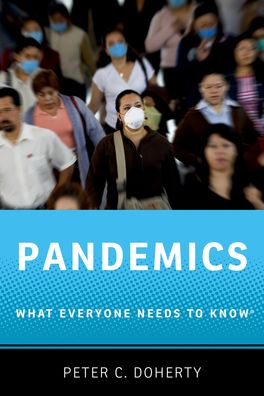Description
Discover the depths of pandemics with Nobel Laureate Peter Doherty's insightful guide. In this essential resource, 'Pandemics,' readers will gain a comprehensive understanding of what pandemics are, how they spread, and the preventative measures we can take to combat them. This book delves into the science behind infectious diseases, explaining the critical roles that vaccines and antiviral drugs play in our defense against potential outbreaks. As we navigate an era marked by high-speed transportation and global trade, the risks of diseases like influenza and SARS becoming widespread are more pronounced than ever. Doherty clarifies that the term 'pandemic' relates more to the ability to spread across borders than to the level of threat posed by a disease. By employing a clear question-and-answer format, the author makes complex scientific concepts accessible to all readers. Moreover, he highlights today's pressing challenges, including climate change, increasing population density, and antibiotic resistance, which complicate our fight against pandemics. This book encourages the proactive measures necessary to brace for future global health crises. Enhance your knowledge and preparedness with 'Pandemics' and arm yourself with the information needed to understand and mitigate these life-threatening situations. Don't miss out on taking ownership of your health in an unpredictable world. FREE shipping available from our Auckland warehouse with a 15-day delivery period, ensuring no unexpected import charges or custom duties on your purchase. Grab your copy today and stay informed!
NOTE: Shipping for this item is FREE, please allow 15 days for shipping. As its shipped from our Auckland warehouse there is no unexpected import charges, custom duties or taxes.
Condition: BRAND NEW
ISBN: 9780199898121
Year: 2013
Publisher: Oxford University Press USA
Description:
Nobel Laureate Peter Doherty offers a level-headed guide to all aspects of pandemics-what they are, how they spread, and what we can do to prevent them.Pandemics. The word conjures up images of horrific diseases sweeping the globe and killing everyone in their path. But such highly lethal illnesses almost never create pandemics. The reality is deadly serious but far more subtle.In Pandemics, Peter Doherty, who won the Nobel Prize for his work on how the immune system recognizes virus-infected cells, offers an essential guide to one of the truly life-or-death issues of our age. In concise, question-and-answer format, he explains the causes of pandemics, how they can be counteracted with vaccines and drugs, and how we can better prepare for them in the future. Doherty notes that the term "pandemic" refers not to a disease's severity but to its ability to spread rapidly over a wide geographical area. Extremely lethal pathogens are usually quickly identified and confined. Nevertheless, the rise of high-speed transportation networks and the globalization of trade and travel have radically accelerated the spread of diseases. A traveler from Africa arrived in New York in 1999 carrying the West Nile virus; one mosquito bite later, it was loose in the ecosystem. Doherty explains how the main threat of a pandemic comes from respiratory viruses, such as influenza and SARS, which disseminate with incredible speed through air travel. The climate disruptions of global warming, rising population density, and growing antibiotic resistance all complicate efforts to control pandemics. But Doherty stresses that pandemics can be fought effectively. Often s
NOTE: Shipping for this item is FREE, please allow 15 days for shipping. As its shipped from our Auckland warehouse there is no unexpected import charges, custom duties or taxes.
Condition: BRAND NEW
ISBN: 9780199898121
Year: 2013
Publisher: Oxford University Press USA
Description:
Nobel Laureate Peter Doherty offers a level-headed guide to all aspects of pandemics-what they are, how they spread, and what we can do to prevent them.Pandemics. The word conjures up images of horrific diseases sweeping the globe and killing everyone in their path. But such highly lethal illnesses almost never create pandemics. The reality is deadly serious but far more subtle.In Pandemics, Peter Doherty, who won the Nobel Prize for his work on how the immune system recognizes virus-infected cells, offers an essential guide to one of the truly life-or-death issues of our age. In concise, question-and-answer format, he explains the causes of pandemics, how they can be counteracted with vaccines and drugs, and how we can better prepare for them in the future. Doherty notes that the term "pandemic" refers not to a disease's severity but to its ability to spread rapidly over a wide geographical area. Extremely lethal pathogens are usually quickly identified and confined. Nevertheless, the rise of high-speed transportation networks and the globalization of trade and travel have radically accelerated the spread of diseases. A traveler from Africa arrived in New York in 1999 carrying the West Nile virus; one mosquito bite later, it was loose in the ecosystem. Doherty explains how the main threat of a pandemic comes from respiratory viruses, such as influenza and SARS, which disseminate with incredible speed through air travel. The climate disruptions of global warming, rising population density, and growing antibiotic resistance all complicate efforts to control pandemics. But Doherty stresses that pandemics can be fought effectively. Often s

